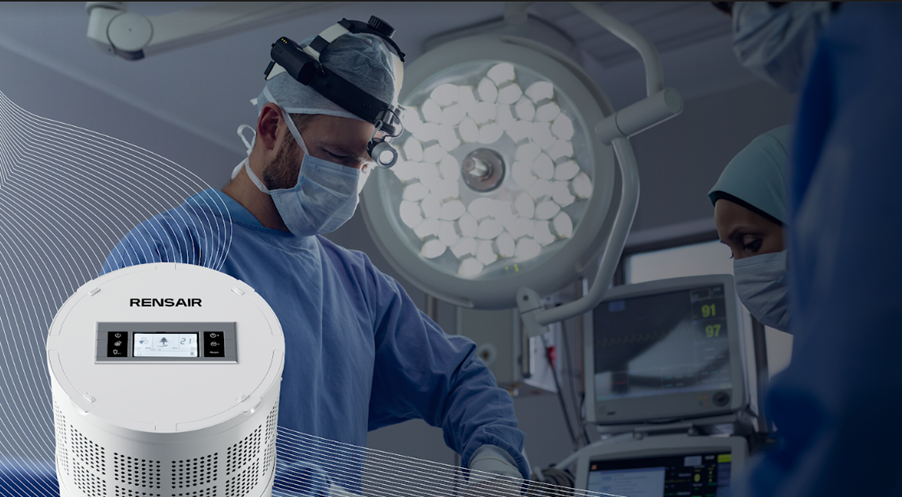Independent NHS tests confirm Rensair air cleaning efficiency

The NHS Innovation Agency has conducted extensive biovalidation testing on the Rensair Core air purifier. The results corroborate existing independent tests carried out by leading scientific laboratories, which have all concluded that Rensair can be used for infection prevention & control in poorly ventilated areas, including those where Aerosol Generating Procedures (AGPs) are undertaken.
The tests carried out by the NHS Innovation Agency conformed to the ‘Liverpool Biovalidation Protocol’, the NHS’s single uniform test protocol for confirming an air purifier’s bio-efficacy. The results confirm that a Rensair Core air purifier achieves a:
- 90% reduction (log-1 reduction) in airborne pathogens per m3 of air in 11.4 seconds.
- 99.9% reduction (log-3 reduction) in only 34.2 seconds.
Therefore, in a typical 40m3 consultation room, the Log 1 and Log 3 clearance times can be achieved in 8.4 and 16.9 minutes respectively.
The test results demonstrated a Clean Air Delivery Rate of 655m3 per hour, commensurate with other independent tests conducted by Eurofins, the Danish Technological Institute and also ESI Group’s independent CFD modelling in an NHS Birmingham dental treatment room.
“Many NHS buildings are under ventilated and do not achieve the WHO’s recommended air change rates for healthcare settings, which rise from 60 litres per second per patient (l/s/p) to 160 l/s/p where AGPs are performed”, said Christian Hendriksen, Co-founder & CEO at Rensair. “Our air purifiers offer a practical, affordable and proven solution for preventing the spread of pathogens, including Covid-19 and nosocomial infections such as Norovirus.”
The Liverpool Biovalidation Protocol was designed to allow NHS departments to compare the efficiency of different air purifiers against a Midtherm 500 air purifier, which was the control air purifier for calibration purposes. This control device required 25.9 seconds to achieve log-1 reduction, a far longer period than the Rensair air purifier. Thus the Rensair air purifier performed 2.3 times better than the Midtherm 500, despite both devices having similar airflow rates.
The Liverpool Biovalidation Protocol was developed at the University of Liverpool by Professor Anthony C. Fisher, Consultant Clinical Scientist, and Dr. Nicholas P. Rhodes, a Reader in Tissue Engineering and Regenerative Medicine. It is expected to contribute to new standards created by the British Standards Institute (BSI) and which should be subsequently drawn up by the International Organisation for Standardisation (ISO).
